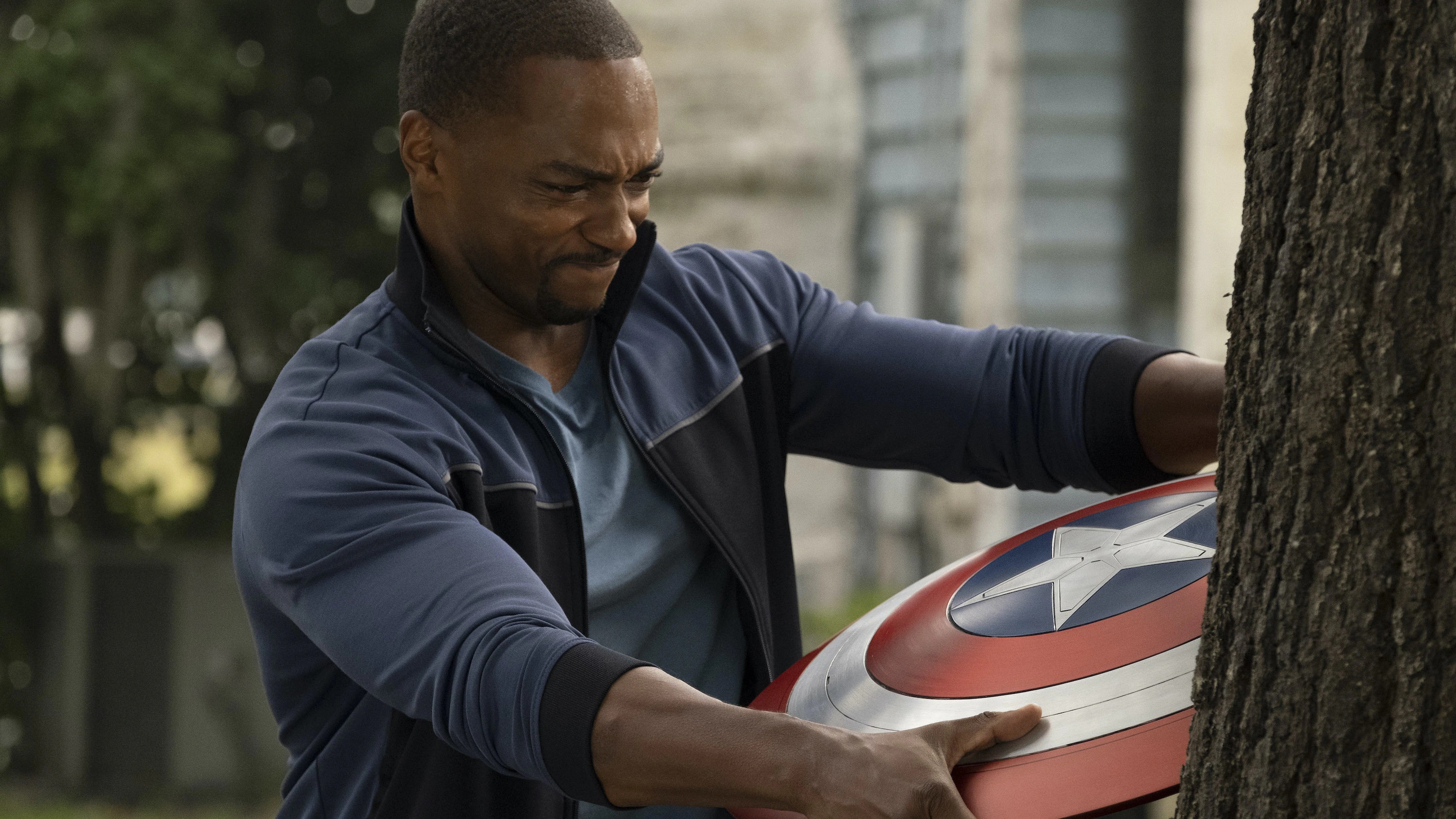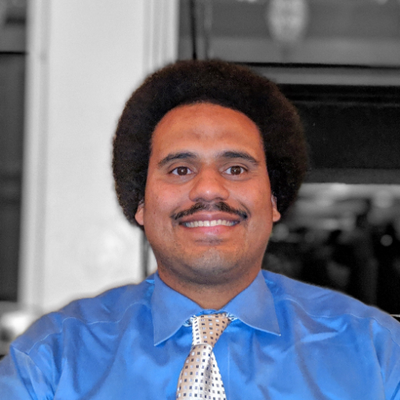'The Falcon and The Winter Soldier'— Can a self-respecting Black man be Captain America?
Is Isaiah Bradley right when he says “If you ain’t bitter, you’re blind”?

The latest updates, reviews and unmissable series to watch and more!
You are now subscribed
Your newsletter sign-up was successful
Want to add more newsletters?

ONCE A WEEK
What to Watch
Get all the latest TV news and movie reviews, streaming recommendations and exclusive interviews sent directly to your inbox each week in a newsletter put together by our experts just for you.

ONCE A WEEK
What to Watch Soapbox
Sign up to our new soap newsletter to get all the latest news, spoilers and gossip from the biggest US soaps sent straight to your inbox… so you never miss a moment of the drama!
This post contains spoilers for The Falcon and the Winter Soldier.
When Steve Rogers first gave Sam Wilson the shield, Sam said that it felt "Like it’s someone else’s". At the time, this felt like a touching tribute to his dear friend. But now, it can also seem like a comment on why being an American hero still feels out of reach for Black Americans like Sam.
In episode 5 of The Falcon and The Winter Soldier, Sam Wilson brings the shield to Isaiah Bradley. Isaiah had a lot of important things to say about the country, its history and its symbols. But his most important comment deals with Sam’s struggle from the end of Avengers: Endgame and throughout this series.
"They will never let a Black Man be Captain America. And even if they did, no self-respecting Black Man would ever want to be"
Isaiah Bradley
Can this give us a deeper insight into why Sam gave up the shield in the first place and how can he reconciles this conflict? Should a self-respecting Black man even want to be Captain America?
The Falcon and The Winter Soldier has been working through a statement on the Black experience in America and in the world of superheroes. While I may believe this was handled better before (Watchmen Episode 6 is an absolute masterclass), I’m glad Marvel has included it here. In this show, Isaiah Bradley stands in for the Black heroes that America has rejected, abused, and erased. He may be a veteran and war hero, but American heroes can hail from other walks of life too. Even a Black man like Sam who believes in ideal outcomes may choose to avoid the mantle in the face of rejection or abuse.
"Those stars and stripes don’t mean nothing good to me”
Isaiah Bradley
In this key conversation with Sam, Isaiah makes a quick reference to the history of the Red Tails (which is worth learning if you don’t already know). He also discusses his own experiences with Black soldiers being secretly used for testing super soldier serum. The results of those tests, which mirror the Tuskegee Syphilis Study, are ugly and deadly but the pain of Black military heroes in America goes way beyond the gruesome acts of a few bad leaders.
My Grandfather was an Army veteran of two wars and a hero, although he would always bristle if we called him that. He fought on the front lines of both World War II and the Korean War, and he lost many friends and fellow soldiers along the way. When he came home, he found that Black American war heroes were rejected from the GI Bill, including college benefits, government-backed mortgages, and occupational training. After working twice as hard as anyone, my grandfather finally purchased a plot of land in a suburb to build his final forever home. During construction, vandals spray painted swastikas, racial slurs and threats on his foundation, desecrating it. He refused to remove it, and I saw it as a child many years before he passed away.
The latest updates, reviews and unmissable series to watch and more!
I remember him telling me as a teenager that the Army was no place for a Black man in America. I don’t know if I struggled with that in the same way that Sam struggled with Isaiah’s message for him, but it wasn’t easy to hear. I took it to heart, and eventually learned from it. To his dying day, my Grandfather proudly wore the colors of the stars and stripes and his veteran gear. But he never forgot that his country had him wear the uniform and kill for the defense of us all, but did not cover him or his family in the same way it covered other war heroes back home.
“You think things are different? You think times are different?”
Isaiah Bradley
These problems not only weigh on the decisions by a current generation of Black men like Sam Wilson, they also keep happening to Black heroes of today. The list of names of tragically killed Black men and women too long to include here. Even with protests and a new generation of heroes rising, the same painful patterns repeat.
Black Army officer Caron Nazario feared for his life while being held at gunpoint and pepper sprayed during a routine traffic stop. Afterwards, he was quoted to say “Your service is not going to save you in this country”. In 2012, my sister and her family found a burning cross on their driveway. This family had been pillars within that neighborhood, as successful business people and active members of their church and community. While two juveniles were arrested, none of the punishments could undo the pain of knowing they were rejected and their home had been desecrated.
Sam may not have lived through the Civil Rights Movement of the of the 1960s, or seen all that Isaiah has seen, but as a Black man in America he has surely had his share of racism and discrimination. As Sam seeks to solve this internal conflict about becoming Captain America, he seems to me to be a bit naïve, but certainly not ignorant. Sam tells us exactly how he is reconciling Isaiah’s powerful statement in a conversation with his sister, Sarah.
“Isaiah has been to hell and back. If I were in his shoes, I’d probably feel the exact same way. But what would be the point of all the pain and sacrifice if I wasn’t willing to stand up and keep fighting?” - Sam Wilson
Like any good soldier and many strong Black advocates for change through history, Sam equates progress with fighting. Black Americans have had to fight for personhood, freedom, every right they have.
"Are the great principles of political freedom and of natural justice, embodied in that Declaration of Independence, extended to us?"
Frederick Douglass
There are Black American heroes that lean towards Sam Wilson side despite being rejected, abused or erased. These heroes who fought for freedom through political and social change span the whole history of the country, with Harriet Tubman, James Lafayette, Frederick Douglass, Dr. Martin Luther King Jr., Malcolm X, Stacey Abrams, and Cori Bush among many others. It’s the words of Frederick Douglass that feel particularly relevant to Sam and Isaiah. In one of his most famous works "The Meaning of July Fourth for the Negro", Douglass is arguing for freedom for Black American people being held in slavery. Through the lens of history, I see him making a larger argument.
"The rich inheritance of justice, liberty, prosperity and independence, bequeathed by your fathers, is shared by you, not by me. The sunlight that brought light and healing to you, has brought stripes and death to me.” - Frederick Douglass
While the legacy of this country and the shield are both complicated, the answers in hindsight are simple: The principles and inheritance of America should have always been and should always be for Black as well as White and all races. Whether superheroes, founding fathers, or heroes of politics and culture, Blacks shouldn’t need permission for the responsibilities and the victories if they’re willing to take them on. There never should have been two Americas in the MCU or otherwise. America is the birthright of Black men and women like Sam and Sarah Wilson. It has always been the birthright from the times of Douglass and Tubman. Stacey Abrams shouldn’t need to lead the fight to keep the right to vote for many Blacks in this country. That these things happened, and still happen, is painful and pathetic.
Sam Wilson — and any other self-respecting Black man or woman — has every right to be Captain America and carry the shield. Doing so wouldn’t have to be an endorsement of the ugly parts of history the way Isaiah sees it, but a rejection of them. It is their birthright from ancestors who built this country and have been fighting for freedom and justice for all ever since.
Roy Delgado is a freelance writer for WhatToWatch. His focus is streaming, specializing on sports. He binge-streams 32 games over the first two days of NCAA March Madness annually. He built his own DVR 15 years ago, and still tinkers to make his media setup its best.


